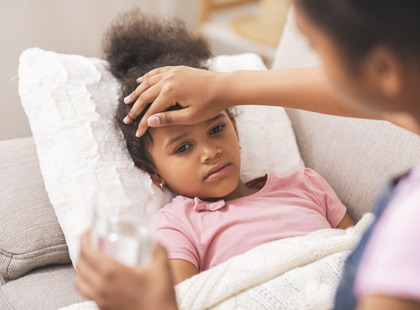Tips for Knowing When to Seek Medical Treatment
Like hospital systems across the country, CHKD is seeing an increase in children suffering from a wide variety of respiratory illnesses.
Our healthcare providers in our pediatric practices, our Urgent Care centers, our emergency department, and the main hospital are treating a large number of children suffering from symptoms of flu, respiratory syncytial virus (RSV), rhinovirus, and COVID-19. Waits may be longer because of this increase in patients.
Viruses cause symptoms that run the gamut. Most children can be safely treated at home and don’t need to be tested for which virus is causing cold-like symptoms. It’s important for families to know these viruses are circulating, how to protect your children from them, how to care for them at home, and signs that your child needs medical care. See our Right Care, Right Time chart to find the best level of care for your child.
What is RSV?
RSV stands for respiratory syncytial virus, a common cause of cold-like symptoms such as runny nose, cough, and fever. Nearly all children catch an RSV infection by age 2.
People infected are usually contagious for three to eight days. There is no vaccine for it, though several candidates are in testing.
Who is at most risk?
Anyone can get RSV, but the people with the most serious symptoms are premature babies, newborns, older adults and people with chronic illnesses like asthma or heart disease, who can get serious airway and lung infections.
The virus can cause babies to have trouble breathing, causing them to breathe fast and deep, using muscles in their chest, which can interfere with eating. Typically, RSV causes a cold, which may be followed by bronchiolitis or pneumonia. Here are some common symptoms of bronchiolitis:
- Flaring of the nostrils.
- Head bobbing with breathing.
- Rhythmic grunting during breathing.
- Belly breathing, tugging between the ribs and/or the lower neck.
- Wheezing.
How can I distinguish the symptoms of RSV from symptoms of flu and COVID-19?
Flu and COVID-19 share similar symptoms to RSV and other viruses, and it might be hard to tell which virus your child has. The important thing is monitoring the symptoms, which can include fevers, chills, headaches, cough, muscle soreness, fatigue, vomiting, diarrhea, shortness of breath, runny nose, sore throat, and knowing when you can safely keep your child home to recover and when you need to seek medical help.
How do I know when to seek medical help?
Call your pediatrician if your child has:
- Symptoms of bronchiolitis, which are listed above.
- Symptoms of dehydration (12 hours without a wet diaper).
- Pauses or difficulty breathing.
- Significantly decreased activity and alertness.
Some children may be at increased risk of developing a bacterial infection, such as an ear infection.
Call your doctor if your child has:
- Symptoms that worsen or do not start to improve after 7 days. (It can take two weeks for coughing to subside.)
- A fever (with a rectal temperature of 100.4°F or higher) and they are younger than 3 months of age (12 weeks).
- A fever that rises above 104°F repeatedly for a child of any age.
- Poor sleep or fussiness, chest pain, ear tugging or ear drainage.
Check out our Right Care Right Time chart for guidance on whether it’s best to go to your pediatrician’s office, an urgent care center, or the emergency department.
Seek immediate care by calling 911 or going to the emergency department if your child has difficult, labored, shallow, or rapid breathing or if they have blue or grayish color to their lips, tongue, or skin. If they are unresponsive, call 911.
What’s behind the increase?
Babies and children who were sheltered from common bugs during the pandemic lockdowns are now encountering viruses that their immune systems might not be prepared to fight.
What’s the treatment?
Treatment is supportive in nature, managing symptoms with rest and comfort measures, and letting the virus run its course. Most children recover on their own. In serious cases, patients in the hospital may need oxygen, a breathing tube, or a ventilator.
How can I protect my child?
Wash hands thoroughly and frequently. Stay home when you or your child is sick. Adults and children 2 years and older should wear masks when in crowded places. Stay away from people who are sick.
If eligible, get flu and COVID-19 vaccines and boosters. During RSV season, an injection of an antibody-based medicine is sometimes prescribed to protect premature infants and other very vulnerable babies.






